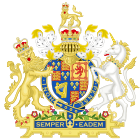Henry Grey (MP) facts for kids
Quick facts for kids Act 6 Ann. c. 2 |
|
|---|---|
| Act of Parliament | |

|
|
| Long title | An Act to enable Henry Grey, second Son of Richard Neville Esquire, to change his Name from Nevill to Grey, according to the Will of Ralph Lord Grey deceased. |
| Citation | 6 Ann. c. 2 |
Henry Grey (born August 17, 1683 – died September 9, 1740) was a British politician. He was a member of the Whig Party. Henry Grey served in the House of Commons from 1709 to 1740. The House of Commons is a key part of the British Parliament.
Contents
Who Was Henry Grey?
Henry Grey was an important figure in British politics. He was known for being a Whig. This was one of the main political groups at the time. He spent many years as a Member of Parliament (MP). This means he helped make laws for the country.
Early Life and a Big Change
Henry Grey was born as Henry Neville. His father was Richard Neville. His mother was Katherine Grey. She was the daughter of Ralph Grey, 2nd Baron Grey of Werke.
When he was young, Henry traveled a lot. He visited countries like Holland, Germany, Italy, and France. This was between 1699 and 1700.
In 1707, something big happened. Henry changed his last name to Grey. This was done through a special law called an Act of Parliament. He did this to inherit land and money. These estates belonged to his uncle, Ralph Grey, 4th Baron Grey of Werke.
Starting His Political Journey
Henry Grey first became an MP in 1709. He was elected for the area of Wendover. A friend named Richard Hampden helped him get this position.
He won the Wendover seat again in the 1710 British general election. However, he faced some challenges. He tried to get elected in Orford in the same election but did not win.
Henry Grey was a strong Whig. In 1711, he voted against making peace with Spain. This showed his political beliefs. He tried to win elections in other places too. He ran in Berwick-upon-Tweed in 1713. He also ran in Wallingford in 1714. He was not successful in these attempts.
Returning to Parliament
Henry Grey returned to Parliament in 1719. He was elected as the MP for Wallingford. He continued his political work.
In 1722, he tried for the Berkshire seat but lost. However, he was elected again in 1723. This time, he became the MP for Berwick-upon-Tweed. His brother, Grey Neville, was already an MP for the same area.
Later in 1723, his brother Grey Neville passed away. Henry inherited his brother's family home, Billingbear House. Henry Grey was elected one last time in 1734. He became the MP for Reading.
Family Life and Legacy
In 1720, Henry Grey married Elizabeth Griffin. She was the daughter of James Griffin, 2nd Baron Griffin of Braybrooke. They did not have any children.
Henry Grey passed away on September 9, 1740. He served in Parliament for many years. He played a part in British politics during his lifetime.
 | Chris Smalls |
 | Fred Hampton |
 | Ralph Abernathy |

